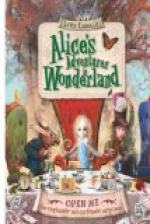|
|
Alice in Wonderland Chapter 12: Alice's Evidence
Alice, who has forgotten how large she has grown, comes forward in such a rush that she tips over the whole jury box. She apologizes, rights the box, and starts stuffing the jurymen back in. The King refuses to proceed until all jurors are in their proper places, so Alice turns one upside-down juror (poor Bill the Lizard again) the right way up, though she is so unimpressed with the abilities of the jurors that she doesn't think there is much significance in whether they're heads or tails up.
And so the trial continues. The King asks Alice what she knows about the matter at hand. When Alice says she doesn't know anything, the King advises the jurors to make a note of this important statement. The White Rabbit corrects the King and tells the jury that his majesty meant to say unimportant. The King mutters both words to himself as if he can't tell the difference. He then proclaims a rule from a book he is holding; rule forty-two states that all people who are more than a mile tall must leave the court.
Alice refuses to leave on the grounds that she is not a mile high, and also because she says the king just made that rule up to get her to leave. The King claims that the mile-high height limit is the oldest rule in the book, but Alice boldly retorts that the oldest rule would be rule number one. This is too much for the King, and he tells the jury to consider their verdict.
The Rabbit again reminds the King that there is evidence still waiting to be presented, most notably a letter that has just been placed in front of him. The Rabbit decides that the Knave wrote the letter to somebody, but there is no address and the letter turns out to be a poem. Strangest of all, the poem appears not to be in the Knave's handwriting at all. The Knave seizes this moment to deny writing the poem and to point out that no signature appears on the poem. The King decides that only a dishonest man doesn't sign his name and therefore the Knave is proven guilty. Alice interjects that there is absolutely no proof and that no one even knows what the poem is about.
The Rabbit, in his function as herald, is called upon to read the poem. He doesn't know where to begin, so he asks the King who advises, "'Begin at the beginning...and go on till you come to the end: then stop.'" Chapter 12, pg. 81 So the Rabbit reads the poem, which the King finds to be a deciding piece of evidence.
Now by this time, Alice has grown so large that she is not afraid of anyone in the court, so she interrupts the king and challenges the court to explain the meaning of the poem. Alice herself doesn't believe there is "'an atom of meaning in it.'" Chapter 12, pg. 82
The King sees a connection between the poem and the Knave: there is a line in the poem about not being able to swim, and the Knave, being made of cardboard, of course cannot swim. The King goes on with his incriminating interpretation of the poem. He wonders about a line in which a women has fits. He assures the Queen that she never has fits, and tells her that the words don't fit her. His majesty is quite annoyed when he has to explain to the court that he had made a witty pun. Once again, the King asks for a verdict.
The Queen contests this judicial procedure by pronouncing, "'Sentence first--verdict afterwards.'" Chapter 12, pg. 83 Outraged by this, Alice tells the Queen that it's nonsense to have the sentence first. Then, when ordered to hold her tongue, Alice refuses. This of course prompts the Queen to order Alice's execution. But Alice is not at all frightened, and she tells her majesty and the court, "'You're nothing but a pack of cards!'" Chapter 12, pg. 83
This brings the whole pack flying at her. Alice screams and tries to push them away until she realizes that she is lying with her head in her sister's lap. Once fully awake, Alice tells her sister about all of the adventures in her dream. Her sister sends Alice back to the house before it gets too late, but she remains on the bank and thinks about all of Alice's wonderful adventures. Alice's sister begins to daydream about Alice and about the creatures in Alice's dream. She thinks she hears the White Rabbit as he hurries past and the Mouse as he splashes around; she believes she hears the rattle of cups at the mad tea-party, the death-sentences of the Queen, the squeals of the pig-baby, the shrieks of the Gryphon, and so on. Alice's sister almost believes that she is in Wonderland herself, but she knows that the sounds she hears are really sheep-bells, a shepherd boy, and the noises of the farm yard. Finally, she pictures Alice as an adult who will still have the heart of a child and will tell her own children strange and wonderful tales like the dream of her adventures underground in Wonderland.



